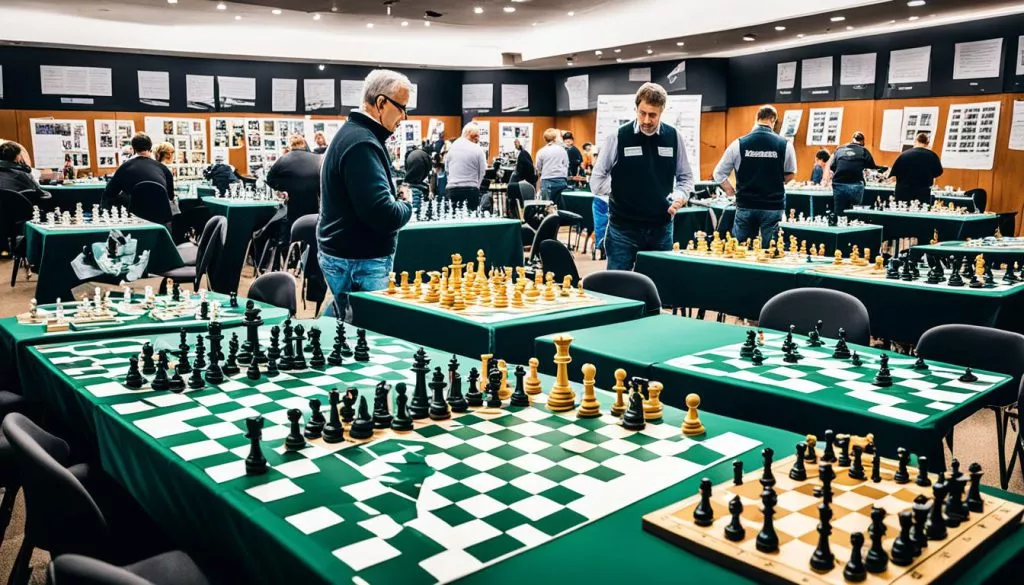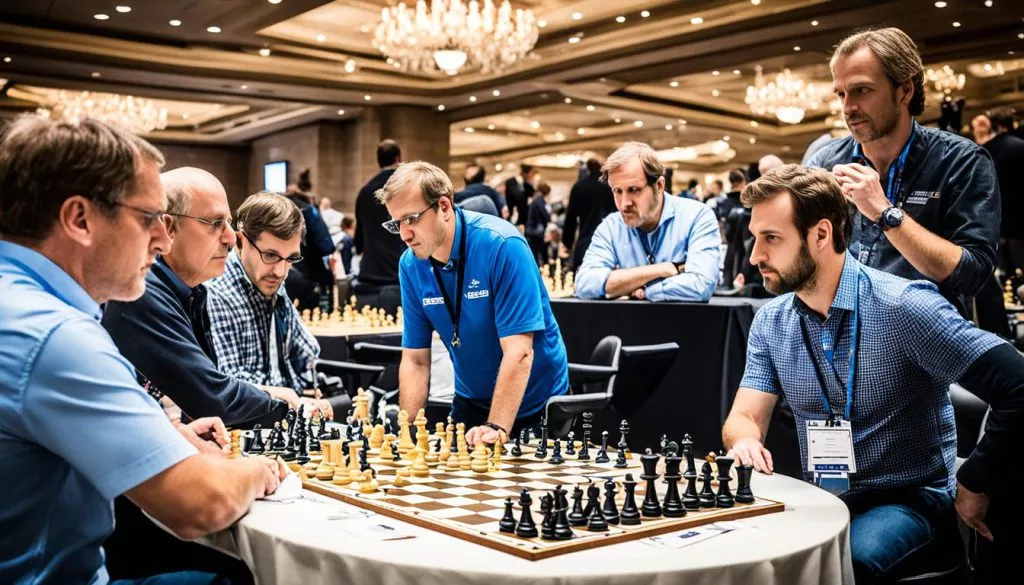Organizing a World Chess Championship is not simple. It requires careful planning and a solid strategy. The team needs to pay close attention to every small detail.
They must understand the international chess scene well. Choosing where the event takes place, finding sponsors, and picking players are just some tasks they handle. All these steps are vital for the championship’s success.
Key Takeaways:
- Organizing a World Chess Championship requires careful planning and strategic event management.
- Logistical considerations, such as securing sponsors and a suitable playing hall, are crucial for a successful tournament.
- The process involves understanding the chess community and the target audience.
- Setting clear goals, choosing the right format, and actively recruiting players are essential steps in the organization.
- Building win-win partnerships with sponsors that resonate with the tournament’s participants is key to long-term success.
The First Edition of the Noël Studer Trophy in 2019
In April 2019, the Noël Studer Trophy was first held. It drew amateur chess players from all over. The event took place in Bern, Switzerland, and showed the vast talent in the chess world.
This tournament was created for amateur players to compete and shine. It had both non-rated and rated categories. So, players at every level could join in the fun of a chess contest.
Around 80 players, aged 5 to 85, joined in the event’s first run. They played through 7 rounds. These rounds tested their chess strategies and moves.
The tournament organizers wanted to reward the players for their hard work. So, they put together a prize fund of $4000. This was to encourage players to show their skills and determination.
The top prize was a high-end computer worth more than $1500. This award was not just a sign of victory. It also thanked the players for their effort. It pushed them to do their best and aim for success.
The first Noël Studer Trophy was a hit among sponsors, players, and organizers. Its success has made it a key event for amateur chess players looking forward.
The Cancelled Edition of the Noël Studer Trophy in 2020
The second edition of the Noël Studer Trophy in 2020 was sadly cancelled due to unexpected events. Around $20,000 had been raised for the tournament from sponsors and supporters. The chosen venue was a big, refurbished conference room in a Bern hotel, ready for over 200 players.
The aim was to double the previous year’s participants and host Switzerland’s largest 1-day chess event. Even with the setback, the team behind the tournament stayed hopeful about its future.
Reasons for Tournament Cancellation
The choice to cancel the Noël Studer Trophy in 2020 was tough but necessary. Sometimes things out of our reach happen, stopping events from occurring. This was the situation here.
Despite this, the team’s main focus stayed on everyone’s safety and happiness. They are eager to ensure the next tournaments are successful.
Impact on the Budget
The tournament’s cancellation led to financial losses. The $20,000 budget could not cover the early expenses. Yet, the organizers are looking forward to making up for these losses. They’re actively seeking new sponsors and support for future events.
Playing Hall Capacity
For the 2020 Noël Studer Trophy, a modern conference room in Bern was chosen. It was spacious enough for more than 200 players. This setup was part of the plan to grow the tournament and provide a great setting for competition.

Future Tournament Growth
The cancellation was a bump in the road, but hope for the Noël Studer Trophy remains high. The aim to increase participants and be Switzerland’s top 1-day chess event is still alive. With backing from sponsors and the chess world, the future looks bright for the Noël Studer Trophy.
Step-by-Step Guide to Organizing a Chess Tournament
Organizing a chess tournament involves key steps for success. Follow this guide for a structured and unforgettable event. Let’s look at what makes a tournament work:
1. Goal Setting and Establishing a Vision
Start by setting clear goals for your chess event. Think about your aim, like showcasing local talent or raising funds. Your event’s purpose will steer your planning and keep you on track.
2. Format Selection
It’s important to choose the right tournament format. Consider time, player preferences, and who will attend. Look at formats like round-robin or knockout, weighing their pros and cons. Pick the format that fits your goals and pleases the players.
3. Budgeting
Budgeting is crucial for tournament planning. Estimate costs and find sources of income. Budget for the venue, awards, marketing, and more. This helps when you’re asking for sponsorships, showing them your event’s financial plan.
4. Team Building
You can’t organize a tournament alone. Form a team with various skills for a smooth event. Give everyone roles that fit their strengths. Teamwork and clear communication will cover every detail of your event.
5. Sponsor Search
Finding the right sponsors is key. Look for local businesses or chess enthusiasts who want to support your cause. Create a strong proposal to show the benefits sponsors get by helping your chess tournament.
6. Playing Hall Acquisition
A good playing hall makes the tournament better. Look for places big enough for your needs, with things like seating and player amenities. Visit sites and choose one that fits your budget.
7. Player Recruitment
Getting players to join is critical. Promote your event on chess sites, through social media, and in clubs. Highlight what makes your tournament special to attract both local and international players.

Planning a chess tournament takes a lot of work, focus, and execution. Follow these steps to ensure a fun and memorable event for everyone involved.
The Challenges and Benefits of Finding Sponsors for Chess Tournaments
Finding sponsors for chess tournaments can be tough. Large companies get lots of requests every day. This makes it hard for smaller events to grab their attention. Yet, small to medium local businesses often like supporting community events.
It’s important to pick sponsors that fit with the tournament’s crowd. This might mean teaming up with chess shops, local chess schools, or online platforms. These sponsors should care about chess just as much as the players do. That way, the event is better for everyone.
Creating strong partnerships is crucial for success. Sponsors get to show off their brand to chess fans. Meanwhile, event hosts get the funds and help they need to make their tournament great. This teamwork helps everyone involved.
Finding the right sponsors for chess events takes planning and strategy. By connecting with local businesses that match the tournament’s vibe, organizers can build valuable partnerships. These relationships make the event better and help it grow in the future.
Benefits of Finding Sponsors from Small to Medium-Sized Local Companies
- Supporting the Community: Local businesses often focus on backing local events. This helps chess tournaments build a sense of community.
- Personalized Approach: Smaller companies can tailor their support in a more personal way. This means partnerships can be more effective and meaningful.
- Accessible Sponsorship: These companies might be more open to working with smaller events. They can offer support that fits the tournament’s budget.
Example Partnership: Chess Online Store

A partnership with a local chess store is a win-win. The store gets more people knowing about its products. The tournament gets financial help or cool chess stuff for players. This makes the tournament experience much better.
The table below shows how both sides benefit from such a partnership:
| Sponsor Benefits | Tournament Benefits |
|---|---|
| Increased brand visibility among chess enthusiasts | Additional financial support for the tournament |
| Opportunity to showcase and promote new products | Access to quality chess sets and merchandise |
| Networking opportunities with players and organizers | Enhanced player experience through product giveaways or discounts |
By working with local companies, chess event organizers can find sponsors who really want to help the chess world. These partnerships lay the groundwork for successful and sustainable events in the future.
The Excitement of the 2023 FIDE World Championship
The 2023 FIDE World Championship has been thrilling with Ding Liren and Ian Nepomniachtchi. They are tied at 7-7 after 14 intense games. This has set up an exciting tiebreak.
The tiebreak has a four-game rapid playoff, followed by blitz games if needed. Players have to play fast and smart in rapid games under time pressure. If the tie remains, blitz games will up the excitement, with faster moves for the world title.
The champion of the tiebreak wins the world title and €1.1 million. Fans globally are watching, waiting to see who wins.

The 2023 FIDE World Championship isn’t just about chess games. It also connects people worldwide through live streaming. Fans can watch every move on Chess.com/TV, Twitch, and YouTube. This way, everyone can enjoy the game’s tension and drama.
The championship is the peak of the chess world. It shows the talents and hard work of two great players. They are battling for the top title in chess.
The Issue of Pre-Arranged Draws in Chess Tournaments
Pre-arranged draws have always sparked debate in chess tournaments. Players sometimes agree on the game’s outcome before it starts. This goes against the rules but still happens often. Pre-arranged draws are linked with match-fixing, which is banned by the International Olympic Committee (IOC) in all sports, including chess.
These draws often happen because players don’t fear strong penalties. Without tough consequences, they might risk it. Plus, it’s hard to prove when draws are pre-arranged. This makes the problem stick around.
Some tournaments, especially long ones, almost expect these draws. Players may arrange a draw to play it safe, save energy, or hit certain goals. While it might seem smart, it really hurts the game’s fairness and competitive spirit.
We need to fix this issue to keep chess fair. Tournament organizers should enforce rules better and have strict penalties. Teaching players about how bad pre-arranged draws are could change the culture. We must promote fairness and integrity in chess.
Conclusion
Putting together a World Chess Championship takes careful planning and focus on details. A key aim is to make everything clear and fair. This helps players do their best in a supportive setting.
Dealing with pre-arranged draws is a big issue in chess. It’s vital to tackle this problem directly. With stronger rules against such arrangements, chess games can stay exciting and fair.
The growth of chess competitions depends on promoting fair play. By sticking to honesty and good sportsmanship, we draw in many kinds of players. This keeps chess interesting for everyone watching across the globe.

